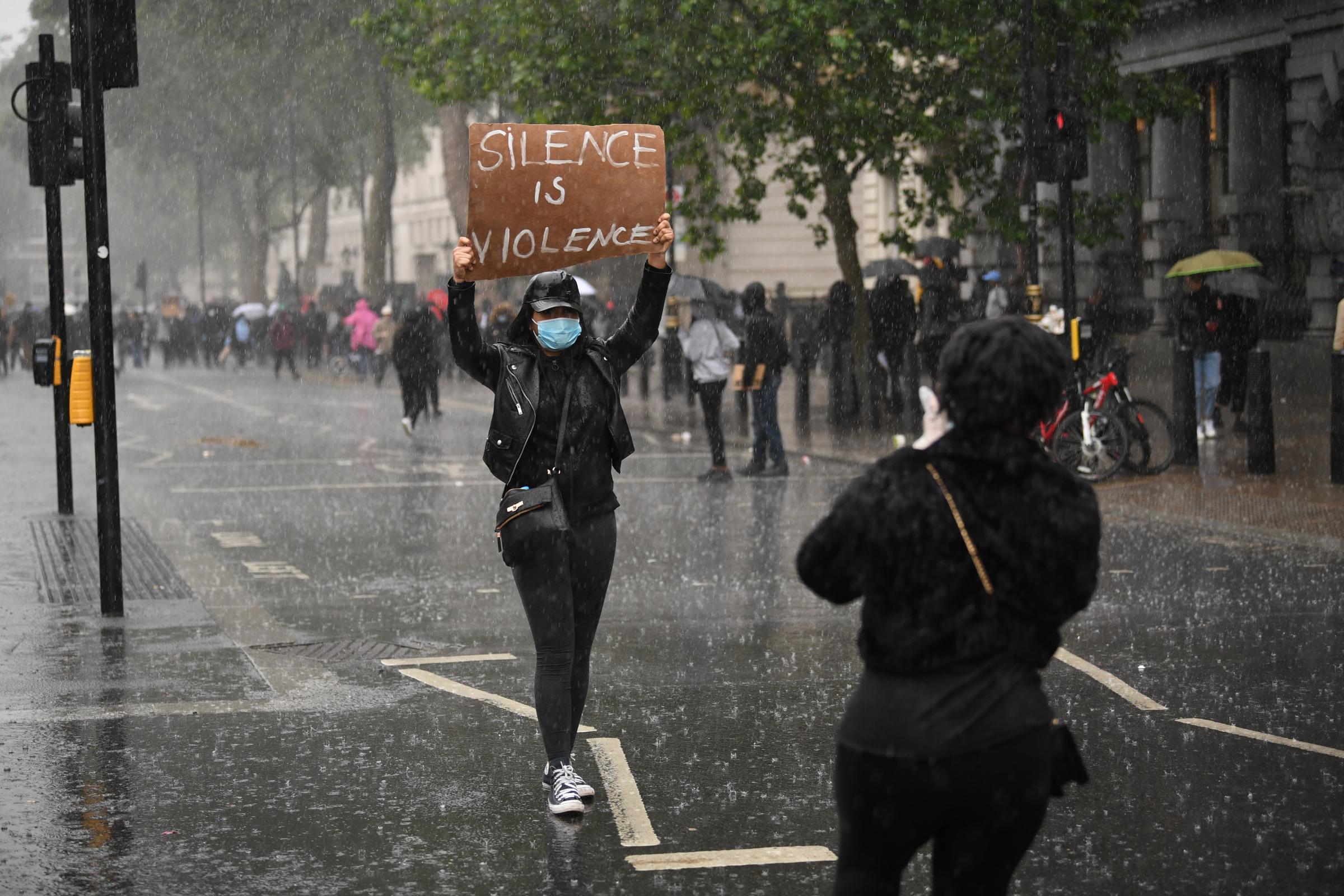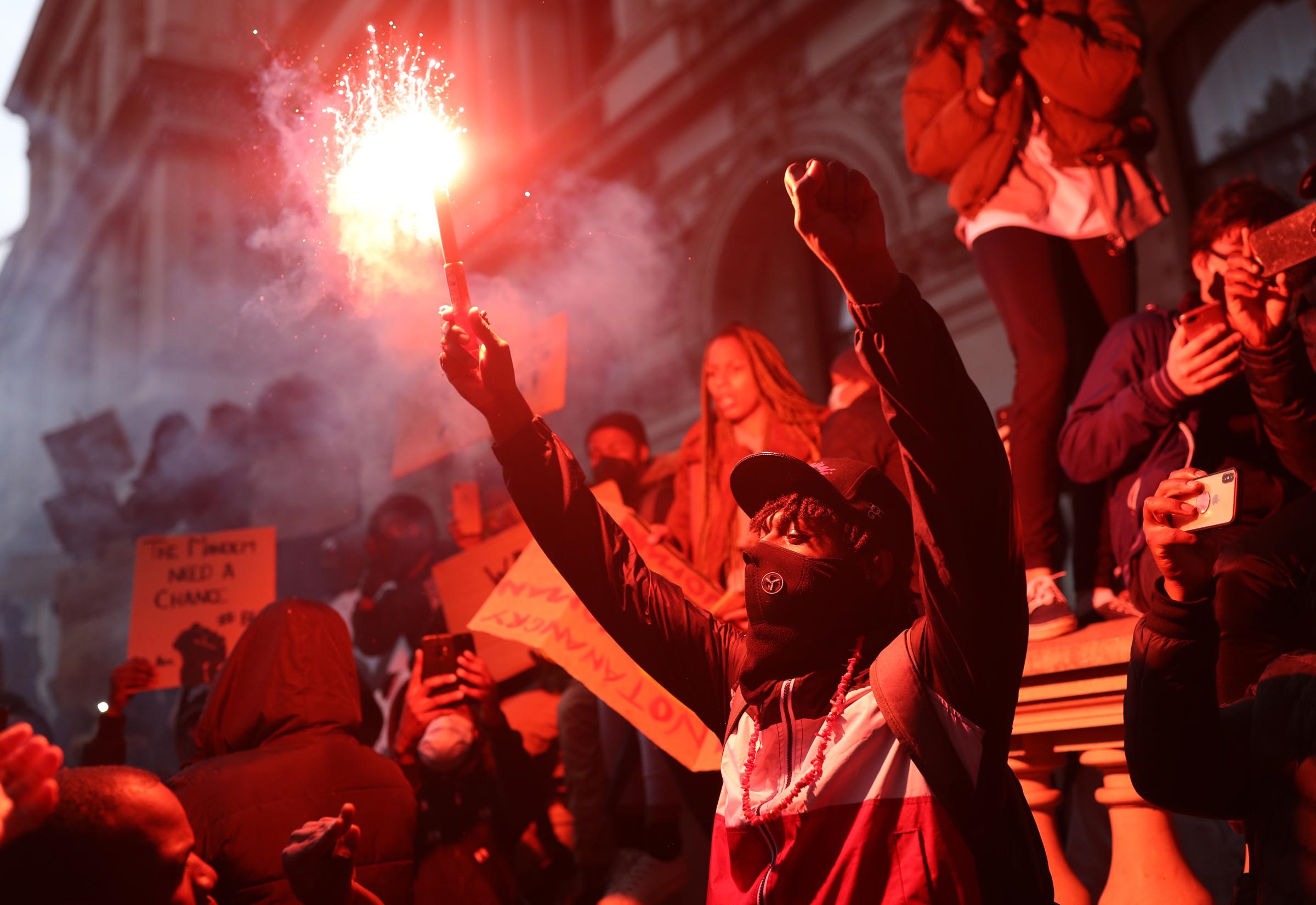Thousands of people gathered in London for Black Lives Matter protests on Saturday and Sunday, the biggest of several demonstrations around the U.K. sparked by the killing of George Floyd in Minneapolis on May 25. It was a coming together of people to protest police brutality and systemic racism not just in the U.S. but in the United Kingdom, too.
On Sunday, in Bristol, a city in the southwest of England, protesters pulled down a statue of a 17th century slave trader and dumped it into the harbor where slave ships once docked.
Although chants of “George Floyd” punctuated the charged air in both cities and around the country, these protests went beyond solidarity with Black Americans. For many in the crowds it was also an overdue reckoning for Britain, the country that pioneered the transatlantic slave trade and one built on the riches of empire. “The U.K. is not innocent,” went a regular chant aimed at those who have said in recent days that racism in the U.S. is a uniquely bad phenomenon.
On Monday, a spokesman for Boris Johnson said the Prime Minister did not believe the U.K. was a racist country. “[Johnson] doesn’t doubt that there continues to be discrimination and racism but does not agree that this is a racist country,” his spokesman told journalists at a government briefing.
Activists disagree. “There’s always been that symbiotic [relationship] between the struggle in America and the struggle in the U.K.,” says Patrick Vernon, a community activist and social justice campaigner. “Historically it’s a different journey, but it’s still the same impact: structural racism, stop and search, poverty, exclusion.”

The chants in London listed victims of racist attacks and police brutality, both in the U.S. and Britain. Justice for Floyd was demanded alongside justice for Belly Mujinga, a Black transport worker who died of COVID-19 in April after being spat on at a central London train station. “I’m here because racism is a bigger threat than COVID,” read a sign held aloft by one protester.
“As Black and minority people, we’re more at risk if we are infected with COVID. So in a way, we’ve got more at stake because we’re actually here,” Landa George, a Black protester, told TIME on Saturday in Parliament Square. Black women are 4.3 times more likely to die from COVID-19 than their white counterparts, according to U.K. government data. (Black men are 4.2 times more likely.) “For me, it means so much that I’m willing to risk that to be out here today,” George said. “The reason this has impacted around the world is that it has highlighted we haven’t really dealt with racism, we haven’t dealt with discrimination and inequality.”
Read More:Why the Protests in the U.S. Are an Awakening for Non-Black People Around the World
Floyd’s death struck a particular nerve in a country where Black people also disproportionately suffer from police brutality. Black people in England and Wales are more likely to have force used against them by police officers than whites. Despite accounting for just 3.3% of the population, Black people experienced 12% of use-of-force incidents in 2017-18, according to government statistics. They also make up 12% of the adult prison population. “We want to see a change in policing, not just in the U.S. but in the U.K., and we want to see changes to how police officers are charged for injustice,” said Tracey Joseph, a Black woman who lives in Hackney, east London, at the Saturday protests. “We wanted to represent the Black community.”
Police presence in the early afternoon seemed fairly light, with officers avoiding the standard playbook for central London protests of corralling crowds onto a specific route, and with few officers visible in Parliament Square. After amassing in front of the Houses of Parliament in Westminster, the crowd splintered in several directions, with different columns heading toward Downing Street, Prime Minister Boris Johnson’s residence; Victoria station, where Mujinga was working when she was spat on; and the U.S. embassy, where a large crowd faced off against police guarding the perimeter. As one group passed through Pimlico, a wealthy area that, like much of London, is home to both mansions and blocks of dense social housing, a middle-aged Black man looked down from the balcony of a public housing estate. He closed his eyes and held up his hands, smiling. Then, he lowered his hands and head, bowing to the protesters as if in worship. The crowds gridlocked five lanes of traffic on a road running alongside the River Thames. Drivers honked their horns in support; some raised fists from their windows in the Black power salute.
As the light rain of the afternoon turned into evening downpours, however, the police presence reportedly became heavier. There were sporadic confrontations between police and protesters, with videos posted on social media showing some protesters throwing bottles and other objects at officers. Police on horseback moved into Parliament Square. In the wet streets one horse bolted, knocking its rider into the road when it hit a lamp post. A video taken seconds later showed the riderless horse knocking a pedestrian to the floor before it was brought under control. On Twitter, conservative commentators seized on the incident as proof of unruly protesters; activists said horses should never have been deployed in the first place. Another video showed protesters chasing a group of retreating police, projectiles flying overhead, and a young woman attempting to stop the advancing group, shouting “this is not why we’re here.” Fourteen officers were injured on Saturday evening, according to the Metropolitan Police. On Sunday, Johnson said on Twitter the protests had been “subverted by thuggery,” adding violent protesters would be “held to account.”

Late Saturday, police reportedly surrounded remaining protesters in a tactic known as “kettling,” allegedly preventing activists from leaving unless they gave their names and personal details. “If this is true, their actions were unlawful and nothing short of an attack on people’s right to protest,” said Grey Collier, advocacy director of Liberty, a civil liberties group, on Sunday.
London’s Mayor Sadiq Khan, a member of the opposition Labour Party, spoke in support of the protesters but criticized those who turned violent. “Londoners of all ages, races and backgrounds joined millions of people around the world yesterday to come together peacefully. I stand with you. George Floyd’s brutal killing must lead to immediate and lasting change everywhere,” Khan wrote on Twitter on Sunday. “The vast majority of protesters in London were peaceful. But this vital cause was badly let down by a tiny minority who turned violent. This is simply not acceptable, will not be tolerated and will not win the lasting and necessary change we desperately need to see.” Sunday’s protests in the capital were peaceful.
Activists in the U.K. are also calling for the national history curriculum in England and Wales to recognize the role of Britain in the slave trade and Empire. Davina Elliot, a Black protester in London on Saturday, spoke of the need to teach British children a more balanced version of history that doesn’t gloss over the country’s imperial and often racist past. “They need to start teaching the correct history and be very honest about the hand they played in slavery,” she told TIME, as protesters around her chanted Floyd’s name. “If people have a better idea of history, then they can see how those things have now got us to where we are today, and they can see that there’s bias. They can see things are geared against certain people, and they will have a better understanding of what’s going on in the world, to know how we move forward.”
— With reporting by Suyin Haynes and Ciara Nugent / London
More Must-Reads from TIME
- Why Trump’s Message Worked on Latino Men
- What Trump’s Win Could Mean for Housing
- The 100 Must-Read Books of 2024
- Sleep Doctors Share the 1 Tip That’s Changed Their Lives
- Column: Let’s Bring Back Romance
- What It’s Like to Have Long COVID As a Kid
- FX’s Say Nothing Is the Must-Watch Political Thriller of 2024
- Merle Bombardieri Is Helping People Make the Baby Decision
Write to Billy Perrigo/London at billy.perrigo@time.com